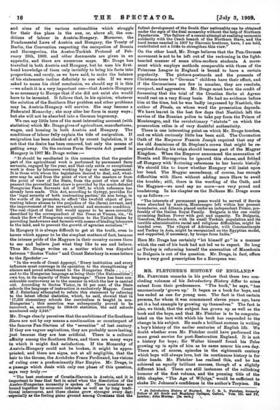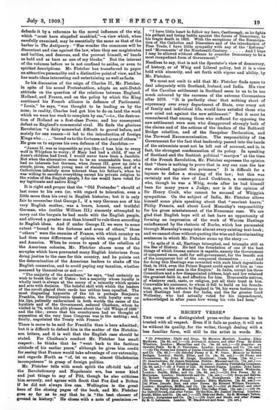MR. FLETCHER'S HISTORY OF ENGLAND.* Mn. FLETCHER remarks in his
preface that these two con- cluding volumes of his Introductory History differ to some extent from their predecessors. "The book," he says, "has unconsciously 'grown up.' It began as a book for boys, and has ended as one for young men. The fact is that certain persons, for whom it was commenced eleven years ago, have set it a bad example by growing up themselves," The fact is also, we think, that the subject has grown up as well as the book and the boys, and that Mr. Fletcher is to be congratu- lated on the tact with which his book has responded to the change in his subject. He made a brilliant success in writing a boy's history of the earlier centuries of English life. We doubt whether even Mr. Fletcher could have performed the same great service for post-Restoration England. It is not a history for boys; Sir Walter himself found his Tales growing up in spite of him as he came nearer his own day. There are, of course, episodes in the eighteenth century which boys will always love, but its continuous history is for older heads. Mr. Fletcher has realised this, and he has achieved an equally brilliant success, though of a slightly different kind. There are still instances of the rollicking humour of the first volume, and the punning title of the fifth chapter, "The Age of W(h)igs," would be sufficient to shake Dr. Johnson's confidence in the author's Toryism. He An Introductory History of Enytend. By C. R. L, Fletcher. formerly Fellow of All Souls and Magdalen Colleges, Oxford. Vol., LEL and IV. London: John Murray. [5s, each.] defends it by a reference to the moral influence of the wig, which "must have stupefied mankind,"—a view which, when carefully examined, may be essentially the same as that of the barber in The Antiquary : "Nae wonder the commone.will be discontent and rise against the law, when they see magistrates and baillies, and deacons, and the provost himsell, wi' heads as bald and as bare as ane of my blocks." But the interest of the volumes before us is not confined to asides, or even to spirited descriptions. Mr. Fletcher has transferred to paper an attractive personality and a distinctive point of view, and he has made ideas interesting and entertaining as well as facts.
In his discussion of the reign of Charles IL, Mr. Fletcher, in spite of his sound Protestantism, adopts an anti-Dutch attitude on the question of the relations between England, Holland, and France, and on the policy by which the King continued his French alliance in defiance of Parliament. "Louis," he says, "was thought to be leading us by the nose; in reality, Charles had got him to do on land the work which we were too weak to complete by sea,"—i.e., the destruc- tion of Holland as a first-class Power, and her consequent defeat as England's commercial rival. He finds the glorious Revolution "a deity somewhat difficult to grovel before, and mainly for one reason—it led to the introduction of foreign Kings who .....'bound us to the fortunes and arms of others.'" He goes on to express his own defence of the Jacobites :-
"James II. was as impossible as you like—I toss him to every wolf in Whigdotn to worry ; if Mary had had a child, if' one of Anne's children had lived, I would never have been a Jacobite. But when the alternative came to be an unspeakable boor, who bad no interests but German, when James III. grew up into a simple, pious, valiant young man of stainless honour, and of a Catholicism infinitely more tolerant than his father's, when he was willing to sacrifice everything except his private religion to the wishes of the English people, I for one would have voted for my legitimate and native King."
It is right and, proper that the "Old Pretender" should at last come to his own (or, with regard to toleration, even a little more than his own) in English histories; but it is only fair to remember that George I., if a very German son of his very English mother, was a brave, honest, and truthful German, who (unlike William III.) sincerely attempted to carry out the bargain he had made with the English people, and allowed a greater man than himself to rule them according to English ideas. And if under George II. we were to some extent "bound to the fortunes and arms of others," those "others" were the enemies of France, with which country we had then some differences of opinion with regard to India and America. When he conies to speak of the rebellion of the American colonies, Mr. Fletcher shares none of the scruples which have prevented many English historians from
doing justice to the case for this country, and he points out the determination of the American leaders to shake off the English connexion, and to avoid paying any taxation, whether assessed by themselves or not :—
"The majority of the Americans," he says, "had certainly no wish to break the tie of Union but a majority whose loyalty is wholly inert is always at the mercy of a minority which speaks and acts with decision. The baleful skill with which the leaders of the revolt played their cards has seldom been equalled. The most disgusting hypocrite of the lot is perhaps Benjamin Franklin, the Pennsylvania Quaker, who, with loyalty ever on his,lips, patiently undermined in both worlds the cause of the loyalists and of the Government, seduced Chatham, whom he visited in '74, with his glib phrases about the 'old Whigs of 1688' and the like ; swore that his countrymen had no thought of separation at the very time Congress was in the making; and, finally, negotiated the Treaty with France."
There is more to be said for Franklin than is here admitted; but it is difficult to defend him in the matter of the Hutchin- son letters, and it is well that the English case should be stated. For Chatham's conduct Mr. Fletcher has small respect : he thinks that he "went back to the factious attitude of his earlier years," although he gives him credit for .seeing that France would take advantage of our extremity,
and regards North as "of, let us say, almost Gladstonian incompetence" in grasp of foreign politics.
Mr. Fletcher tells with much spirit the oft-told tale of the Revolutionary and Napoleonic era, has some kind and just things to say of Pitt, though he also criticises him severely, and agrees with Scott that Fox died a Briton if he did not always live one. Wellington is the great hero of the closing pages of the book, and Mr. Fletcher goes so far as to ,say that be is " the_ best chooser of ground in history." He closes with a note of pessimism "I have little heart to follow my hero, Castlereagh, as he fights his gallant and losing battle against the forces of Democracy, to his tragic death in 1822. With the exceptions of the Emancipa- tion of the Catholics and Dissenters and of the introduction of Free Trade, I have little sympathy with any of the 'Reforms'
and 'Movements' of the Nineteenth Century And liopo I may be allowed without offence to consider Democracy to be a most inexpedient form of Government."
Needless to say, that is not the Spectator's view of democracy, of history, or of Whig and Liberal policy, but it is a view held with sincerity, and set forth with vigour and ability, by Mr. Fletcher.
We must not omit to add that Mr. Fletcher finds space to deal adequately with Scotland, Ireland, and India. His view of the Caroline settlement in Scotland seem to us to be too much coloured by the excesses of the extreme Covenanters after 1678. "It is perfectly clear that nothing short of supremacy over every department of State, over every act of family and individual life, would have satisfied those who now cried out against the new settlement." But it must be remembered that among those who suffered for opposing the new settlement were men who disapproved strongly both of the claims and of the actions of the leaders of the Bothwell Bridge rebellion, and of the Sanquhar Declaration, and the Torwood Excommunication. The responsibility of the Government for the fact that leadership passed into the hands of the extremists must not be left out of account, and is, in fact, the strongest condemnation of its policy. In speaking of Scotland and the Scottish political " martyrs " at the time of the French Revolution, Mr. Fletcher expresses the opinion that "there is nothing to prove that in any one case the law was strained against the prisoners." It is difficult for a layman to define a straining of the law; but this was certainly not the view of Lord Cockburn, a contemporary who, though he was a Whig, wrote after he bad himself been for many years a Judge; nor is it the opinion of Sir Henry Craik, who cannot be accused of Whiggish sympathies. On the subject of India, Mr. Fletcher allows himself some plain speaking about that " esutient knave," Philip Francis, and about Lord Macaulay's responsibility for his gross misstatement of the Nuncomar case. We are glad that English boys will at last have an opportunity of forming an impression of the work of Warren Hastings uninfluenced by the rhetoric of Burke, which has permeated through Macaulay's essay into almost every existing text-book ; and we cannot close without quoting the wise and discriminating sentences in which Mr. Fletcher sums up the story :—
" In spite of it all, Hastings triumphed, and triumphs still at the Bar of History. He laid the foundation of one of the best things of which human nature is capable, namely the Government of conquered races, unfit for self-government, for the benefit not of the conquerors but of the conquered themselves And for doing this Hastings was rewarded with such black ingratitude that, in 1814, even the Prince Regent could speak of him as one of the worst used men in the Empire.' In India, except his three Councillors and a few disappointed jobbers, high and low retained the greatest faith in, and affection for him. Honourable natives, of whatever rank, caste, or religion, put all their trust in him. Cornwallis his successor, to whom it fell to build on his founda- tion, gave, on his return to England in '94, his warm testimony to what Hastings had done for India, and the far greater Lord Wellesley, who had actually voted for his impeachment, acknowledged in after years how wrong his vote had been."















































 Previous page
Previous page